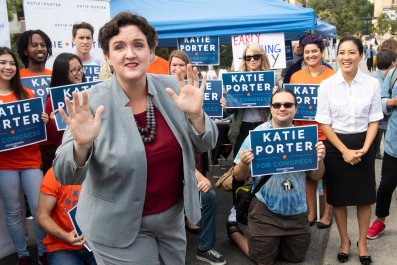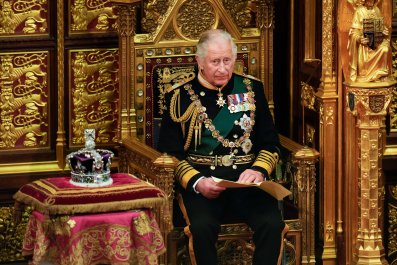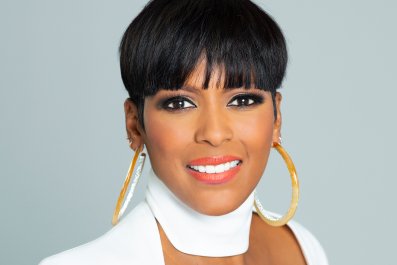Chinese official communications often echo a phrase of President Xi Jinping's about "great changes unseen in a century." Increasingly that line seems less like propaganda and more like a simple statement of a vast transformation in the world order.
This overhaul, years in the making, is taking the clearest shape right now in the Middle East, a region where the U.S. has devoted many resources in the 21st century. In March, China helped arrange a peace deal between Iran and Saudi Arabia, taking the kind of broker role in the region long held by the U.S. Washington currently has no diplomatic ties with Tehran and relations with Riyadh have grown strained.
"We bluster, we threaten, we menace, we sanction, we send the Marines, we bomb," says Chas Freeman, a veteran U.S. diplomat, "but we don't ever use the arts of persuasion."
Freeman was principal interpreter for President Richard Nixon on his visit to China in 1972. The trip ultimately resulted in the U.S. recognizing the People's Republic over Taiwan and the opening of an embassy in Beijing, where Freeman served as deputy chief of mission. Now he tells Newsweek, Washington's "moment of diplomatic glory" is long over. "What has happened is that the American ability to coerce is declining," he says. "We seem to be approaching the world as though we still have an unchallenged authority that we imagined we did at the end of the Cold War."
Many nations are pursuing their own paths, sometimes called "strategic autonomy." The concept remains a hallmark of India's non-aligned foreign policy, even as it improves relations with the U.S. It is also gaining traction with once-close U.S. friends such as Saudi Arabia, and has appeared in comments by French President Emmanuel Macron following his April visit to Beijing.
Freeman, who once served as U.S. ambassador to Saudi Arabia, says, "The world is changing; the kaleidoscope is in motion. We're trying to put all the pieces in place," he says. "The basic aim of our foreign policy is retention of primacy, which is impossible. Nothing is forever. No great power is always supreme forever."
"It's not just that the Pax Americana, the American Century, which turned out to be about 50 years long, is over," he adds, "but the 500 years of Euro-Atlantic global ascendancy are over."
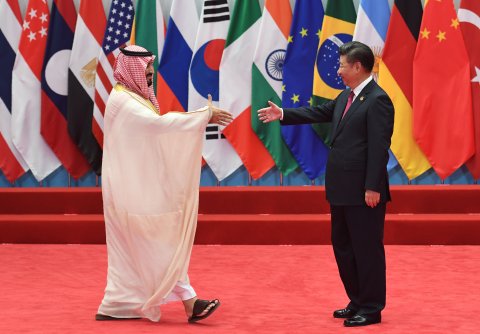
A Non-Hostile Takeover
China has long been positioning itself to take advantage of the shift. "Since the reform and opening up in the late 1970s, China has been developing and deepening relations with other countries on the basis of mutual benefit and respect for each other," Hongda Fan, a leading Chinese expert and professor at Shanghai International Studies University's Middle East Studies Institute, tells Newsweek.
"China has not actively provoked conflicts with other countries for decades," Fan adds. "This leaves China with few enemies in the world, and also enables China to obtain a good external development environment."
Although China has several territorial disputes with key neighbors, the People's Republic has emerged as the top trading partner of nearly 130 countries. It has promoted its economic and diplomatic clout across the Global South, including Africa and Latin America, through ventures such as Xi's Belt and Road Initiative, a network of infrastructure projects spanning nearly 150 countries.
Courting the Middle East has proven to be particularly valuable for China, the world's number one oil importer. Iran and Saudi Arabia both want spots in trade and security blocs BRICS Plus and the Shanghai Cooperation Organization. Their membership could give Beijing the ability to withstand a potential U.S. sanctions campaign like the one levied against Russia over its war in Ukraine.
Oil was at the heart of the post-World War II strategic partnership forged by the U.S. with Saudi Arabia. The pact outlasted Arab-Israeli wars, an ensuing 1970s OPEC boycott and 9/11, in which 11 of 15 Al-Qaeda hijackers were Saudi nationals. The U.S. was also willing to overlook alleged human rights abuses by Saudi Arabia. But President Joe Biden's branding of Crown Prince Mohammed bin Salman as a "pariah," together with reduced U.S. aid to a Saudi-led war effort in Yemen and attempts to revive a nuclear deal with Iran, have opened a substantial rift with Riyadh.
Meanwhile, few Middle Eastern and Muslim countries have joined the U.S. in condemning China's treatment of its mostly Muslim Uyghur minority. And as the U.S. has moved to end its "forever wars" to focus on the challenge posed by China, a Middle East left divided and in disarray continues to seek assistance.
"The United States has indeed ignored the urgent needs of the Middle East countries for development," Fan says, "or did not pay enough attention to it."
"Washington needs to understand that such challenges come not only from China, but also from many other countries," Fan adds. "More and more countries, including China, hope to control their own destiny and hope to see a multipolar world."
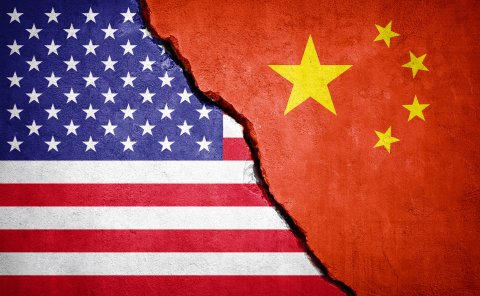
'The World Has Changed'
In Saudi Arabia's case, this means translating energy influence into geopolitical capital. This shift has been met with wariness by Washington, where Biden warned of "consequences" after Riyadh defied U.S. calls to increase oil production and instead joined fellow OPEC Plus states, including Iran and Russia, in cutting output last October.
Mohammad al-Sabban, former senior adviser to the Saudi energy minister, tells Newsweek, "The United States continues to think that it is the only pole in the world, and that is untrue."
"The world has become multipolar. There is China, there is Russia, there is the United States, there is the European Union and also there is the Kingdom of Saudi Arabia."
It's not just oil that fuels Saudi clout. Saudi Arabia has unique status across the Muslim world as custodian of Islam's two holiest sites, and the Kingdom, the fastest growing of the world's major economies, is a leading member of the Arab League and the Organization of Islamic Cooperation.
Meanwhile the Kingdom is also undergoing an internal transformation. While Riyadh long clung to tradition and embraced fundamentalist Islamism, Crown Prince Mohammed has tied his legacy as the country's future king to modernization, cultivating a national identity beyond religion. The U.S. once approved of this metamorphosis but has grown increasingly suspicious.
Sabban says the U.S.' "pursuit of commanding and unilateral policies" will "not pass with any nation, any nation that respects its sovereignty and that respects itself." He adds, "The Kingdom of Saudi Arabia makes its decisions according to its interests, especially economic and political. The Kingdom of Saudi Arabia does not care about any other opinions or the opinions that are imposed on it."
Sabban links the country's economic and geopolitical "diversification" directly to Crown Prince Mohammed's "Vision 2030" strategy and argues, "Everyone must respect the interests of the Kingdom of Saudi Arabia, just as we respect the interests of others." He warns, "No country should interfere in the Kingdom of Saudi Arabia making its decisions in the international arena."
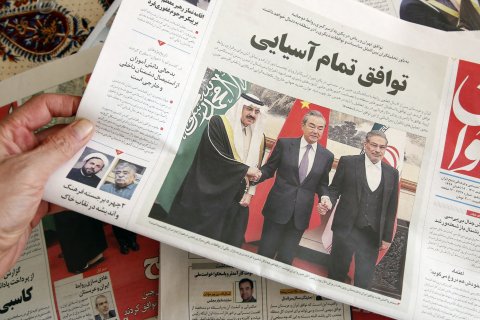
'A Profound Reassessment'
Some diplomats worry that recent events in the Middle East and elsewhere, 30 years after the fall of the Soviet Union, show the U.S., for all its military, financial and cultural power, has lost its appeal to much of the world. Jack Matlock, the last U.S. ambassador to the USSR, says, "The example we are offering the world today is not as attractive as it might have been in 1991."
Matlock, who began his tenure in the Foreign Service in 1956, tells Newsweek China's success asserting itself around the world, "should inspire a profound reassessment leading to a change of course" in Washington.
Today, U.S. communication with top adversaries has reached an all-time low. Meanwhile, China pursues a growing list of geopolitical goals, Russia wages war in Ukraine with no end in sight, Iran rebuilds ties with rivals and North Korea accelerates nuclear weapons development. Sanctions, the mainstay of U.S. diplomatic action, have so far done little to dissuade foes.
While Washington has portrayed the world as a struggle between democracies and authoritarians (in which vital partners such as Saudi Arabia do not fit comfortably), Matlock says "ideology and form of government should not matter."
"To have a peaceful, prosperous world able to cope with unprecedented challenges such as environmental degradation, terrorism and violence of all types, massive flows of population, the threat of pandemics and the avoidance of nuclear war or use of other weapons of mass destruction, we need to deal with all countries with respect," he says.
He warns that, much like the doomed Soviet Union, the U.S. approach relies on the outdated belief "that the U.S. had the knowledge and power to transform the world if only it used its military and economic dominance to change other societies."
This line of thinking, Matlock argues, propagates the notion "that 'we won the Cold War,' that the break-up of the USSR marked the end of the Cold War and Russia was the defeated party, and that the collapse of the Communist system proved that capitalism and 'democracy' were the inevitable future of mankind, that nuclear weapons made us invincible, and therefore our leadership was necessary for transforming the world."
"These were false assumptions," he argues, "and impossible goals."
Tom O'Connor is a NEWSWEEK senior writer and deputy editor covering the Middle East, China, Russia and North Korea. Follow him on Twitter @ShaolinTom.





